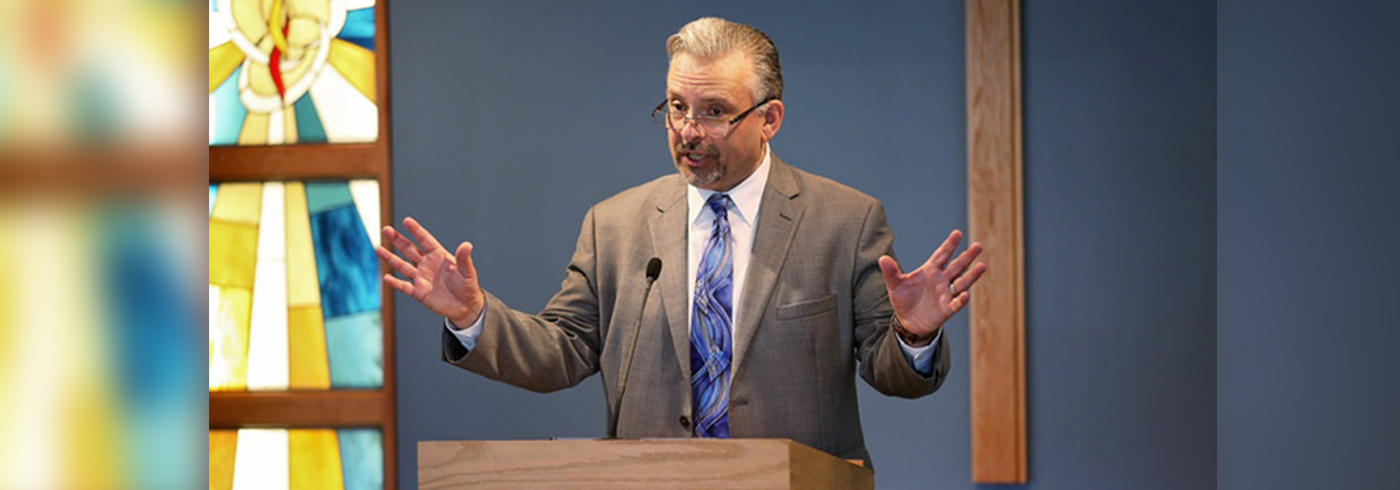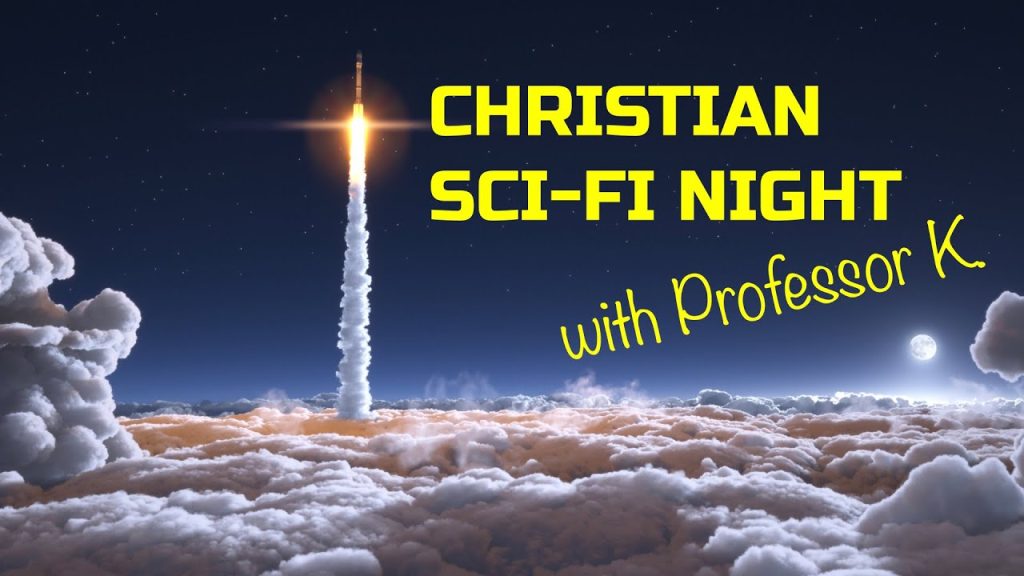Playing God Leads to Trouble
 AG professor and science fiction fan, Jason Karpf, reveals how science fiction can be used to reach a segment of society for Christ.
AG professor and science fiction fan, Jason Karpf, reveals how science fiction can be used to reach a segment of society for Christ.

In today’s science fiction (sci-fi) cinema as well as in sci-fi movies and books of past generations, the quest for ultimate power seems to be a common theme. But could humans or even superhumans be given or attain even a sliver of godlike power and remain uncorrupted?
That type of question along with many others are thoughts explored by Jason W. Karpf, the creator of the ministry, Christian Sci-Fi Night with Professor K.
Karpf, a science fiction author and adjunct professor at North Central University in Minneapolis and the University of Valley Forge in Phoenixville, Pennsylvania, attends Life Assembly Church in Maple Grove, Minnesota, with his wife, Anni. A former Hollywood child actor and screenwriter, Karpf teaches courses such as Film Appreciation, Advertising, Public Speaking, and Freelance Writing.
“In my ministry, we look at science fiction from the Christian perspective,” Karpf says. “In fact, Scripture and science fiction teach the same lesson: Playing God leads to trouble.”
Karpf’s conversational message and use of sci-fi cinema resonates with the more mature generations who recall Frankenstein with Boris Karloff or Rod Serling’s original Twilight Zone masterpieces as well as those generations who had their first tastes of sci-fi through shows and movies such as Star Trek, Star Wars, or even just the latest Marvel movie.
Jim Olson, 66, is the associate pastor at Life Assembly Church. He enjoys science fiction and has attended Christian Sci-Fi Nights led by Karpf, who launched the fledgling ministry last year.
“I lead the men’s ministry at Life Assembly, and I was looking for different ways to engage the men,” Olson says. “Jason’s Christian Sci-Fi Night seemed to be a very interesting way to engage a broader spectrum of men — as a science fiction appeals to a wide variety of ages.”
Alan Lundberg, a recently retired engineering manager, says he has thoroughly enjoyed the Sci-Fi Nights, noting how they open avenues of communication between generations.
“It (the night) gave exposure to science fiction to all the age groups,” he says. “Everyone — the younger men and some of the guys who are really older — had some context in order to discuss the evening together.”
Karpf, who has had a lifelong passion for science fiction, says that he was encouraged by friends and family to pursue his passion.
“I thought, Can I do this and still serve Jesus?” Karpf says. “And I realized, Of course I could – God is everywhere and Christian science fiction is a thriving sub-genre . . . so, I went with my heart, began writing Christian sci-fi (Brimstone 1 and The Deliverer are his latest sci-fi releases), and that has led to this ministry, Christian Sci-Fi Night with Professor K.”
However, even though Sci-Fi Nights do create common ground for multiple generations to intermix, the focus of the evenings reaches beyond sci-fi to the message the episode or movie is communicating in light of Scripture.
Evan Lundberg, a high school sophomore who is more of a Marvel movie fan, says that in addition to the building of relationships, Sci-Fi Night has enhanced the way he watches science fiction.
“I’m looking more at what’s important, what’s in the background — the villains and the role they play and who exactly has the power . . . who is playing the role of God,” he says. “In Scripture, the power points to Christ, while in the shows, it often points to people trying to take the place of God.”
Olson notes that the lessons communicated also guide Christians to consider their responses to life’s challenges.
“Jason is able to point to the human condition (within the episode or movie) and what the response should be from the Bible — what we should do in light of the Bible,” Olson says. “Scripture reinforces the fact that the world without Jesus is a dark world and how people who don’t have Jesus react and how we, as Christians, should let the Holy Spirit show through us instead of our flesh.”
Prior to every Christian Sci-Fi Night, Karpf prepares questions from a Christian worldview for people to consider as they view the evening’s sci-fi episode or movie.
“It’s very much like a life group,” he explains. “We watch the episode or movie and then discuss it. I’ll identify specific points and ask people to offer supporting Scripture. For example, I might ask which Scripture passages do an episode or certain character violate or uphold. This leads to a very interactive and Scripture-based discussion.”
Susan Hansen, who is 59 and a registered nurse, acknowledges that she’s not a super sci-fi “geek,” but she enjoys the genre. She also enjoys Karpf’s approach to science fiction and using it to impact lives for Christ.
“There are a lot of underlying themes of good versus evil in science fiction,” she says, “but if you look at it a little differently, with a Christian aspect, you can see that there’s more to it.”
Alan Lundberg, who admits he does lean more toward the sci-fi “geek” side, says that he has watched many of the original Star Trek and Twilight Zone episodes multiple times and knows many of them by heart, but now they often take on new meanings.
“For example, each time you read Scripture, all of sudden you might see something you’ve never seen before,” he says. “Now, as I watch the (sci-fi) shows with the context in which Jason is bringing them, it’s like a revelation — I see things in a new light . . . and how an episode might have more of a religious connotation than I originally thought.”
Hansen also believes Karpf’s ministry offers those who are not Christians a way to connect with Christians and be exposed to the gospel in a non-threatening way.
“I think it makes Christians more relatable (to non-Christians),” she says. “It makes Christians seem more like real people, not just some ‘holier-than-thou’ stereotypes, but people who participate in regular activities.”
Currently Karpf is hosting Christian Sci-fi Night with Professor K in the Minneapolis area but says he will be looking to branch out as opportunities arise. He believes there is a lot of interest in Christian sci-fi and a lot of opportunities to open conversations with those who simply don’t understand Christianity.
Alan Lundberg agrees.
“There are social and spiritual contexts that are within sci-fi drama that you now have new basis for conversation,” he says. “You can have a spiritual conversation with someone in the context of sci-fi who may have not been willing to do so before, but now are because of the sci-fi context.”
As Hansen observes: “Sci-fi is not evil, it can be used as a message to reach a whole population out there who needs to know about Jesus . . . it’s a great way to introduce how Christians can be in the world and not of it.”
That type of question along with many others are thoughts explored by Jason W. Karpf, the creator of the ministry, Christian Sci-Fi Night with Professor K.
Karpf, a science fiction author and adjunct professor at North Central University in Minneapolis and the University of Valley Forge in Phoenixville, Pennsylvania, attends Life Assembly Church in Maple Grove, Minnesota, with his wife, Anni. A former Hollywood child actor and screenwriter, Karpf teaches courses such as Film Appreciation, Advertising, Public Speaking, and Freelance Writing.
“In my ministry, we look at science fiction from the Christian perspective,” Karpf says. “In fact, Scripture and science fiction teach the same lesson: Playing God leads to trouble.”
Karpf’s conversational message and use of sci-fi cinema resonates with the more mature generations who recall Frankenstein with Boris Karloff or Rod Serling’s original Twilight Zone masterpieces as well as those generations who had their first tastes of sci-fi through shows and movies such as Star Trek, Star Wars, or even just the latest Marvel movie.
Jim Olson, 66, is the associate pastor at Life Assembly Church. He enjoys science fiction and has attended Christian Sci-Fi Nights led by Karpf, who launched the fledgling ministry last year.
“I lead the men’s ministry at Life Assembly, and I was looking for different ways to engage the men,” Olson says. “Jason’s Christian Sci-Fi Night seemed to be a very interesting way to engage a broader spectrum of men — as a science fiction appeals to a wide variety of ages.”
Alan Lundberg, a recently retired engineering manager, says he has thoroughly enjoyed the Sci-Fi Nights, noting how they open avenues of communication between generations.
“It (the night) gave exposure to science fiction to all the age groups,” he says. “Everyone — the younger men and some of the guys who are really older — had some context in order to discuss the evening together.”
Karpf, who has had a lifelong passion for science fiction, says that he was encouraged by friends and family to pursue his passion.
“I thought, Can I do this and still serve Jesus?” Karpf says. “And I realized, Of course I could – God is everywhere and Christian science fiction is a thriving sub-genre . . . so, I went with my heart, began writing Christian sci-fi (Brimstone 1 and The Deliverer are his latest sci-fi releases), and that has led to this ministry, Christian Sci-Fi Night with Professor K.”
However, even though Sci-Fi Nights do create common ground for multiple generations to intermix, the focus of the evenings reaches beyond sci-fi to the message the episode or movie is communicating in light of Scripture.
Evan Lundberg, a high school sophomore who is more of a Marvel movie fan, says that in addition to the building of relationships, Sci-Fi Night has enhanced the way he watches science fiction.
“I’m looking more at what’s important, what’s in the background — the villains and the role they play and who exactly has the power . . . who is playing the role of God,” he says. “In Scripture, the power points to Christ, while in the shows, it often points to people trying to take the place of God.”
Olson notes that the lessons communicated also guide Christians to consider their responses to life’s challenges.
“Jason is able to point to the human condition (within the episode or movie) and what the response should be from the Bible — what we should do in light of the Bible,” Olson says. “Scripture reinforces the fact that the world without Jesus is a dark world and how people who don’t have Jesus react and how we, as Christians, should let the Holy Spirit show through us instead of our flesh.”
Prior to every Christian Sci-Fi Night, Karpf prepares questions from a Christian worldview for people to consider as they view the evening’s sci-fi episode or movie.
“It’s very much like a life group,” he explains. “We watch the episode or movie and then discuss it. I’ll identify specific points and ask people to offer supporting Scripture. For example, I might ask which Scripture passages do an episode or certain character violate or uphold. This leads to a very interactive and Scripture-based discussion.”
Susan Hansen, who is 59 and a registered nurse, acknowledges that she’s not a super sci-fi “geek,” but she enjoys the genre. She also enjoys Karpf’s approach to science fiction and using it to impact lives for Christ.
“There are a lot of underlying themes of good versus evil in science fiction,” she says, “but if you look at it a little differently, with a Christian aspect, you can see that there’s more to it.”
Alan Lundberg, who admits he does lean more toward the sci-fi “geek” side, says that he has watched many of the original Star Trek and Twilight Zone episodes multiple times and knows many of them by heart, but now they often take on new meanings.
“For example, each time you read Scripture, all of sudden you might see something you’ve never seen before,” he says. “Now, as I watch the (sci-fi) shows with the context in which Jason is bringing them, it’s like a revelation — I see things in a new light . . . and how an episode might have more of a religious connotation than I originally thought.”
Hansen also believes Karpf’s ministry offers those who are not Christians a way to connect with Christians and be exposed to the gospel in a non-threatening way.
“I think it makes Christians more relatable (to non-Christians),” she says. “It makes Christians seem more like real people, not just some ‘holier-than-thou’ stereotypes, but people who participate in regular activities.”
Currently Karpf is hosting Christian Sci-fi Night with Professor K in the Minneapolis area but says he will be looking to branch out as opportunities arise. He believes there is a lot of interest in Christian sci-fi and a lot of opportunities to open conversations with those who simply don’t understand Christianity.
Alan Lundberg agrees.
“There are social and spiritual contexts that are within sci-fi drama that you now have new basis for conversation,” he says. “You can have a spiritual conversation with someone in the context of sci-fi who may have not been willing to do so before, but now are because of the sci-fi context.”
As Hansen observes: “Sci-fi is not evil, it can be used as a message to reach a whole population out there who needs to know about Jesus . . . it’s a great way to introduce how Christians can be in the world and not of it.”



